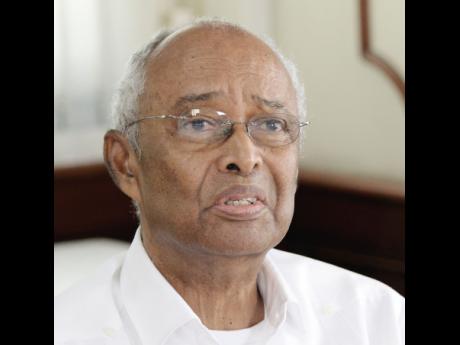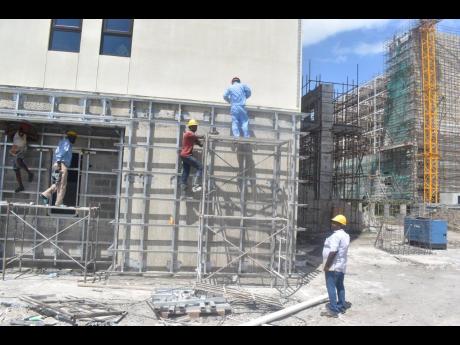Engineers’ Angle | The long journey towards a National Building Act - Pt 1
As a brew master whose day job is making beer, I have found the journey of crafting a modern building code for Jamaica to be an extremely fascinating and humbling one.
I was persuaded by colleagues to work on a new building code for Jamaica as my project for my year as president of the Jamaica Institution of Engineers (JIE) in 2002, notwithstanding that I was a chemical engineer and not directly involved in the building industry.
I was not requested to take on this project by the Government or asked to lead any industry task force.
In my naivety, I did not seek anyone's permission to proceed, and fortunately, up to this point, I have not yet had to ask for anyone's forgiveness.
I remain amazed that without a detailed business plan, firms provided grant funding to kick-start this project. I am even more amazed that so many professionals sacrificed their billable hours to contribute their knowledge and expertise.
I don't recall ever writing to any government office requesting that personnel be released to work on this project, yet many government professionals attended the many meetings that were held.
In all, more than 108 professionals came on this building code journey with me, and I wish to again thank them for their hard work and persistence. The value of their work is estimated at more than $300 million, and I used the term estimated because the work was all voluntary. Jamaica owes them a significant debt of gratitude for their selfless contributions to the national good.
In October 2009, we handed over to the prime minister the application documents for a modern building code that was to become a voluntary standard, held and managed by the Bureau of Standards Jamaica.
It is my firm belief that a properly enforced Building Act that mandates the use of the Jamaican Building Code will, over time, improve the safety and resilience of Jamaica's built environment.
While the work on the building code was progressing, the committee sought assurances from the Ministry of Local Government that a submission seeking the Cabinet's approval for a proposed Building Act would be done concurrently to enable the legislation to be in place when the technical aspects of the code was completed. This was promised for the first quarter of 2007, but it was not completed.
In January 2010, after the magnitude 7.0 earthquake devastated Haiti, I wrote to the then Prime Minister Bruce Golding requesting that he used his office to ensure that the requisite laws and regulations that would mandate the use of the building code were promulgated.
I further requested that the training of the government officials, who would be charged with its administration, be dealt with as an urgent priority.
In early 2010, the JIE wrote to the executive director of the Bureau of Standards suggesting that a committee be formed under the bureau's aegis, to support the drafting of a National Building Act.
The committee was to be called the National Building Code Implementation Committee (NBCIC), and I was asked to chair that committee. I accepted with alacrity since a new Building Act would mandate the use of the new National Building Code, and after all the work we had put into its creation, I did not wish to see the code languishing for too long as a voluntary standard.
The NBCIC was made up of representatives from the following stakeholders, some of whom would be involved in the drafting of the act and its regulations.
- Association of Local Government Authorities
- Bureau of Standards Jamaica
- Cabinet Office
- HEART Trust/NTA
- Incorporated Masterbuilders Association of Jamaica
- Institute of Planners
- Jamaica Institute of Architects
- Jamaica Institution of Engineers
- Ministry of Local Government and Community Development
- National Environment Planning Agency
- National Housing Trust
- University of Technology.
Starting March 2010, the committee met monthly under the auspices of the BSJ, and quickly developed an implementation schedule based on advice from knowledgeable public officers.
The schedule indicated that if this exercise followed the usual course of pursuing such matters, even with a few optimistic assumptions, passage of this legislation would be unlikely before 2012.
This timeline was deemed unacceptable, and an alternative plan was devised which envisaged contracting out some of the legal drafting work in order to accelerate the process.
The Cabinet Secretary, Ambassador Douglas Saunders, was enjoined in facilitating this accelerated plan, and he was supportive of this approach since an early completion of the Building Act would facilitate other contingent benefits to the Jamaican government.
He offered to intervene with the Chief Parliamentary Counsel, who indicated that his office could achieve the accelerated timelines without the contracting out of any of the work. A bill was in fact produced in late 2011.
I will continue to chronicle the journey to a new Building Act, next week.
- Noel daCosta has worked as chief engineer, brew master. Send questions and comments to editorial@gleanerjm.com or jie@cwjamaica.com. You may also leave your comments for the JIE's Technical Committee at our Facebook page: Jamaica Institution of Engineers JIE.


